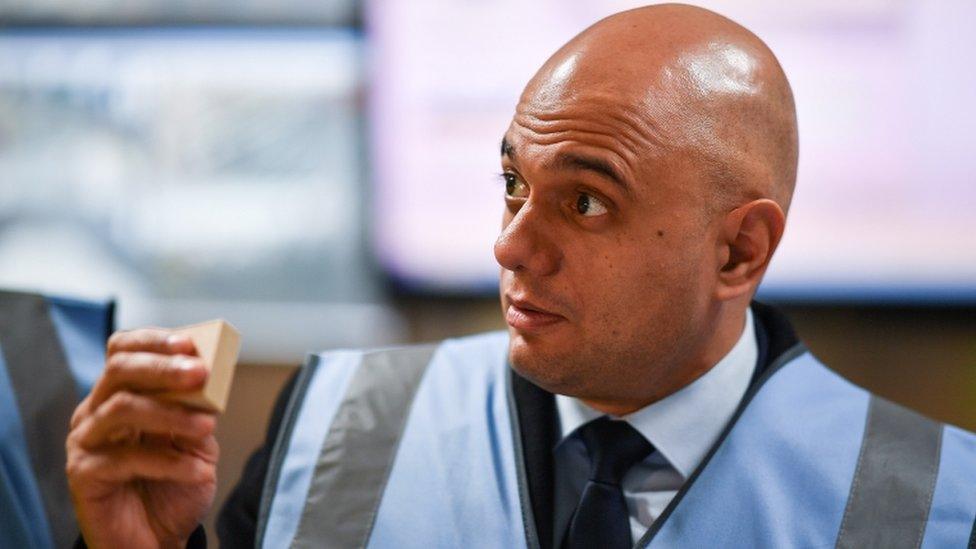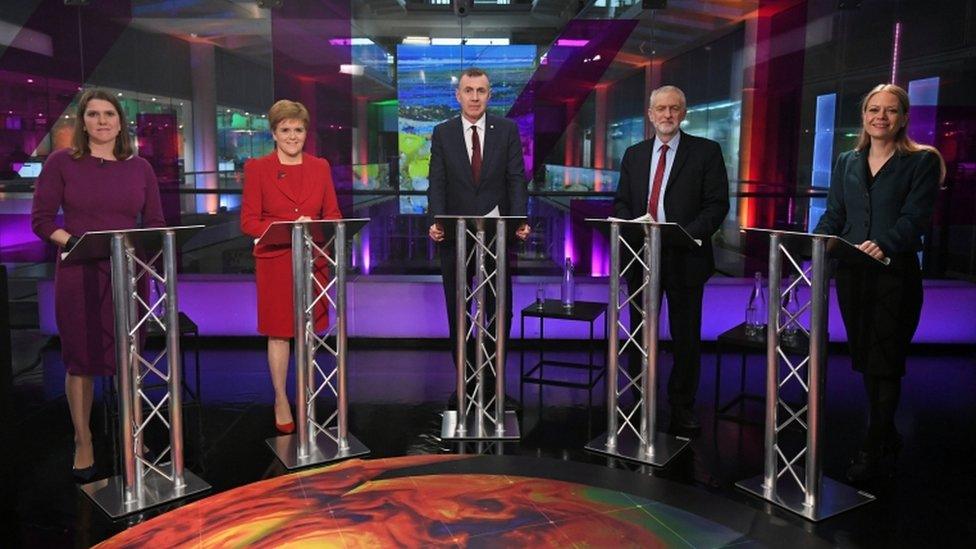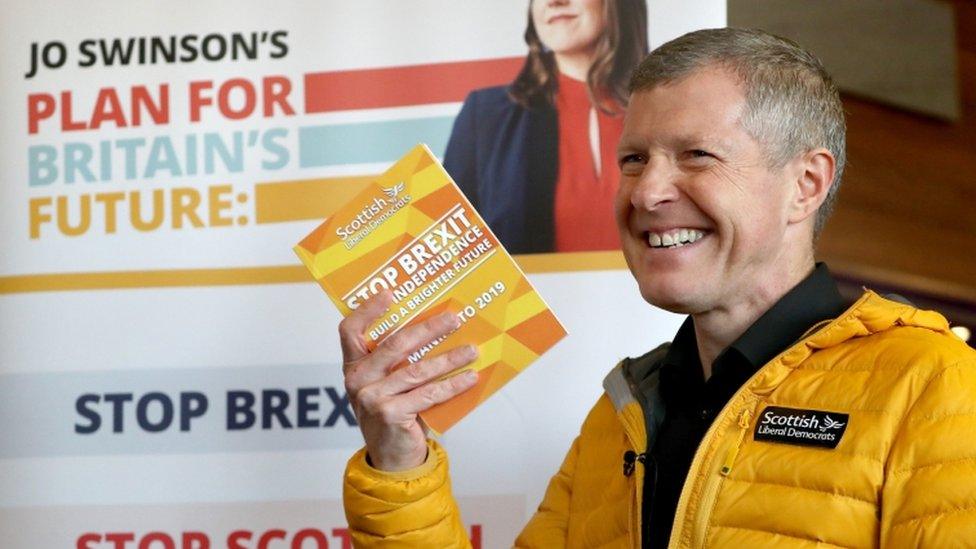General election 2019: Tory chancellor warns SNP over Labour 'alliance'
- Published

Sajid Javid was making a campaign visit to Stirling
The UK chancellor has warned Nicola Sturgeon against "getting into bed" with Labour to secure a second independence referendum.
Sajid Javid insisted that Labour leader Jeremy Corbyn would "absolutely" seek an alliance with Ms Sturgeon's SNP if there was a hung parliament.
But Mr Javid claimed that Labour was "riddled" with anti-Semitism.
And he said Ms Sturgeon would "have to explain how she can prop someone like that up".
Mr Corbyn has denied that he would offer indyref2 in return for the SNP backing a Labour government if no party wins an overall majority in the election on 12 December.
But Ms Sturgeon, who says she wants to hold a referendum next year, has predicted that the Labour leader would have "no choice" but to do so if he wants to become prime minister.
The first minister has already ruled out doing any deal with the Conservatives after the election, and has said the SNP would not enter into a formal coalition with Labour - but would seek a "progressive alliance" with other parties.
As he made a campaign visit to Stirling - a seat the Conservatives narrowly won from the SNP at the last election in 2017 - Mr Javid predicted that a government led by Mr Corbyn and supported by Ms Sturgeon would be "chaotic".

Nicola Sturgeon and Jeremy Corbyn took part in a Channel 4 environment debate on Thursday which Boris Johnson declined to take part in
He claimed that an "alliance" between the two leaders would see referendums on both Brexit and independence held next year.
The chancellor added: "Nicola Sturgeon will have to accept that yes, she might get her beloved referendum.
"But she will getting into bed with a individual that has serious issue with Britain's Jewish community, who has been caught time and time again denigrating the Jewish community and has a problem of anti-Semitism riddled throughout his party.
"She would be supporting such an individual, and she would have to explain how she can prop up someone like that who, just a couple of days ago, the chief rabbi was moved to say was not fit for office."
Mr Javid also criticised the SNP's record in government in key devolved areas such as education, the NHS and policing.
The Conservatives, Labour and SNP have all withdrawn their support from election candidates this week over anti-Semitic or Islamophobic comments on social media.
How have the SNP responded?
Deputy First Minister John Swinney told BBC Scotland that the SNP's objective at next month's election was to remove Boris Johnson and the Conservatives from power.
And he pointed out that his party had finished second in every seat won by the Conservatives at the last election.
Mr Swinney, who was campaigning alongside SNP candidates in Aberdeenshire and Angus, added: "It is a choice between Boris Johnson's candidate or the SNP, and I don't want people in Scotland to waken up on 13 December with the nightmare of Boris Johnson in Downing Street with a majority.
"That would be disastrous for Scotland. The NHS will be put up for sale under Johnson's trade plans, we will be taken out of Europe against our will.
"That is not what Scotland needs, so a strong SNP vote and SNP gains is what we need in this election".
What about Labour?
Earlier this week, the chief rabbi claimed that Labour - which has been embroiled in allegations of anti-Semitism for more than three years - is not doing enough to root out anti-Jewish racism.
In an interview with the BBC's Andrew Neil on Tuesday, Mr Corbyn was asked four times whether he would like to apologise to the British Jewish community - but declined to do so.
However, he has stressed that there is no place for anti-Semitism within Labour and said those guilty of anti-Jewish racism have been "brought to book".
Scottish Labour leader Richard Leonard said on Friday that he had been working closely with the Jewish community in Scotland to ensure that "we win back their confidence".
He added: "There is a long history of the Labour movement, the Labour Party and the Jewish community being fused together and working for the same goals. I want to get back to a position where we are there again".
Mr Leonard, who was speaking as he visited Livingston to promote his party's proposals for creating green jobs, said the choice facing voters was between five more years of the Conservatives or a Labour government that would "change the way our economy works, redistribute power in society and end poverty and inequality".
What else has been happening on the campaign trail in Scotland?

Willie Rennie pledged to "stop Brexit and stop independence" when he launched the Scottish Lib Dem manifesto
The Scottish Lib Dems pledged to "build a brighter future" as they launched their election manifesto at a curling rink in Edinburgh
Leader Willie Rennie said his party was the only one committed to "stopping Brexit and stopping independence".
And he argued that the country needed to move on from "constitutional chaos" and instead focus on the "issues that really matter".
The party also says it is the only one with a "radical, credible and detailed plan" to tackle climate change.